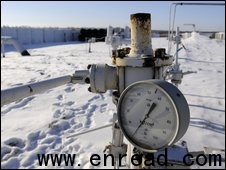| ||||||||||||||||||||||||||||||||||||||||||||||||||||||||||||||||||||||||||||||||
|
Russia's economy will shrink by 7.5% in 2009, President Dmitry Medvedev has said - but claimed Kremlin intervention1 had prevented a worse decline. 俄国总统梅德韦杰夫称,2009年俄国经济将萎缩7.5%,但是他声称克里姆林宫的干预已经阻止了更坏衰退的出现。  Oil is sharply lower than it was a year ago Russia, which is heavily reliant(依赖的,信赖的) on oil exports, has been hit by the sharp fall in energy prices. Mr Medvedev said the decline was "very serious" and admitted the government had been surprised at how severely2 Russia had been hit by the crisis. However the predicted slide in GDP was less than earlier predictions. "The real damage to our economy was far greater than anything predicted by ourselves, the World Bank and other expert organisations," Mr Medvedev told Russian television. But he said that measures to save jobs and stabilise the country's banking3 sector4 had paid off. Investment worries Mr Medvedev added that while the rouble(卢布) had initially5 declined against the dollar in the first months of the crisis, the currency was now "entirely6 calm and stable". The most recent official figures suggest that in the year to August, Russian GDP declined 10.2% compared with the same period in 2008. But it is expected to come out of recession in the third quarter. Mr Medvedev spoke7 of other challenges the country's economy faced - though was not specific about what these were. However overseas investment in the country is being deterred8 by the perception(认识,概念) that state-run firms bully9 or intimidate10(威胁,恐吓) foreign companies into handing over control of their investments. There is also widespread cynicism(犬儒主义) as to how much President Dmitry Medvedev is really in control, and whether power really lies with Prime Minister and former President Vladimir Putin. 点击  收听单词发音 收听单词发音
|
||||||||||||||||||||||||||||||||||||||||||||||||||||||||||||||||||||||||||||||||
- 发表评论
-
- 最新评论 进入详细评论页>>



